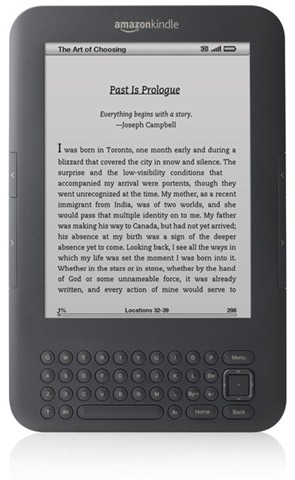 Speaking of e-books versus p-books, the Oroville Mercury-Register has an article on the frictions that e-readers can cause in book clubs—not the kind where you get a book a month, but those in-person meetings where readers get together to discuss a particular book they’ve all read.
Speaking of e-books versus p-books, the Oroville Mercury-Register has an article on the frictions that e-readers can cause in book clubs—not the kind where you get a book a month, but those in-person meetings where readers get together to discuss a particular book they’ve all read.
E-readers can complicate activities based on physical books, such as Christmas gift swaps. They can also arouse the ire of print-centric club members.
"Well, disgust might be too strong a word, but it is close," [one book club member] says, describing the "avidity with which, when we’re ready to discuss what book to read at our next meeting, my friends jump to their Kindles. It’s as though the other people aren’t even in the room."
Other readers note the advantage of being able to read anywhere with devices that are lighter and more pocketable than books, making it a lot easier to find the time to finish books in time for meetings to discuss them.
Audiobooks also merit a mention, and have their own special problems—members who listen to the books don’t have any way to bookmark or quote specific passages, which can make discussion a little less specific.
It’s interesting to see a discussion of issues that e-book readers can bring up in club situations. I hadn’t given it much thought before, but it seems clear that e-books are bringing changes everywhere, and some of them not necessarily the ones you’d expect.































People freaking out over new things and resisting change… even in unimportant areas, and even with friends’ and colleagues’ urging? Sure I expect these changes. Those of us who embrace new technology have been seeing petty stuff like that our entire lives. It’s only those who try out something new on a rare basis who see it and say, “Who would’ve expected that?”
Typically, book club members are older people who have time to read. I belong to two book clubs and at age 67, I’m in good company with other retirees. Many of them are not technophobes and are still rooted in the pBook mentality. Personally, when I attend a book club discussion, I take written notes, not the book/Kindle itself. On the other hand, now that Amazon has included ‘real’ page numbers with their books, using a Kindle shouldn’t be an issue. What difference does it make?
That note on audiobooks raises a thought: there’s a big opportunity for audible.com or some other big audiobook maker to add bookmarking capability. I know iTunes tracks can have chapter markers, so apple could just add the ability to insert such things into the audiobooks they sell.
This would be good for blind readers and students, too.
I belong to two book clubs. I’m noticing more and more members with e-readers and not just the younger members. E-readers have not caused any friction in either of my clubs.
@asotir, the option for bookmarking Audible audiobooks already exists. What is missing is the ability to associate those bookmarks with a page number and synchronize the bookmarks with your Kindle.
My book group (which is Jane Austen-centric) is still mostly paper, but there are a few of us with electronic reading devices. When we read classics such as Fanny Burney’s Evelina, as we did earlier this year, several of us did the audiobook (from Librivox)/ebook thing, and it was fine. We also send out a list of discussion questions, so we do have things to talk about.
Last year, one of the members, whose husband was laid off for much of the year, made a point of getting all the books from the library; yes, paper books. You can’t write in or highlight those, either. When I was a kid, nearly all my reading was from the library; perhaps that’s why I never got in the habit of marking up novels.
Some people have the knack of creating problems where none exist and none need to exist.